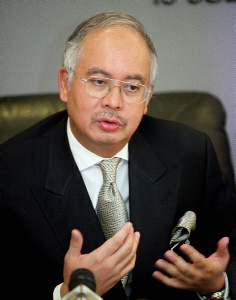The TPP offers Malaysia an opportunity to be part of a larger global process, and to truly liberalise its economy. The latter cannot be achieved without enduring the resistance that will emanate from domestic groups. But this is precisely where Najib faces his dilemma.
The TPP would give Najib a mandate to conduct domestic economic reforms, and help him push the economy up a couple of notches. It would also bring stakeholders closer to the harsh realities of a fast-changing, increasingly competitive global market. In turn, this would make for a more efficient and productive Malaysian economy that is more clued into the demands of the market.
Yet domestic pressures hang threateningly around Najib. Much as he himself may be convinced of the virtues of liberalism and an undistorted market, he must contend with a part of his constituency that does not. This includes groups of businessmen whose niche markets depend almost exclusively on the largesse of the government, and who have always seen lobbying as the easy alternative to facing up to competition.
Najib has been candid in admitting that studies are being undertaken on the possible impact of the TPP on bumiputera (ethnic Malay) businesses. On the one hand, he probably thinks that their dependence on government support impedes them from facing (and taking advantage of) the global economy, and that this state of affairs has to end someday. The TPP agreement might be a convenient way of nudging these businesses to take advantage of the wider opportunities available to them.
On the other hand, it will also be a distressing process for many. It is easy for a trade negotiator or an economist to note that there will be winners and losers in any free trade agreement. But when the losers are made up of a sizeable number of people, and possess considerable political power, statements such as this provide little comfort. They amount to academic generalisations, and are among the silliest public statements that a government official could make.
Opposition to the TPP has also been bolstered by America’s involvement in the equation, a matter that raises more interest and emotion than usual. Even more problematic is the uncertainty that surrounds the issue. Any free trade agreement involves an element of risk: one can make an educated guess at the possible outcomes, but it would be foolhardy to offer guarantees. The TPP by its nature would have a higher risk threshold.
Events have since come to a head, with former prime minister Tun Mahathir Mohamad presenting himself as a rallying point for those who would lose in a more liberalised world, and for non-governmental organisations that are ideologically opposed to liberalisation and America’s dominance in the world.
It is true that the TPP is not without its problems. Najib, for instance, recognises that the issue of intellectual property rights and its potential impact on the pharmaceutical industry might be cause to pause and reflect.
Still, Najib probably sees no contradiction between embracing the liberal order and securing the ability of Malays to participate in the global economy. Yet in the meantime, he will have to reassure those who will lose out in the short term. Despite his bold vision, Najib has not done a great deal to engage the public in terms of either the TPP or Malaysia’s place in the new global economic order. In fact, it is only recently that discussions on the TPP have been held with select stakeholders. The public need to be convinced that the TPP will bring Malaysia forward in a real and tangible sense.
The TPP could give Najib a valuable opportunity to persuade China to engage with the United States, and lead the region into a new economic era. But a prophet is not always recognised by his own people, and much will depend on how Najib handles his dissenters at home.
Shankaran Nambiar is a senior research fellow at the Malaysian Institute of Economic Research.


The anti-social TPP’s regulations will stop nations from enforcing environmental and human rights laws in the name of profit for the corporation. We are bringing the world closer to corporation as is prominent within NAFTA. TPP will restrict or ban labeling if they impede fre trade; that includes health warnings on cigarette packages, and even the dolphin-safe tuna label – or make those labels meaningless. GMO (those unsafe frankenfoods) labeling in the US and elsewhere will be banned.